Can a humidifier set off a smoke alarm
Smoke alarms or smoke detectors are important safety sensors that are compulsory in many places. It is common to see smoke alarms installed in offices, shopping malls, and other public places. Many fire marshals emphasize the need to have a smoke detector for the entire house and how having one can help in detecting flash fires and save countless lives. Since smoke alarms detect smoke, it is often noticed that they confuse steam from humidifiers as well. Steam coming out from a bathroom or humidifier can also set off a smoke alarm.

In this article we will discuss in brief how can a humidifier set off a smoke alarm and what you can do in the case of false alarms. Let us get started!
3 Key Takeaways:
🚀 Humidifiers can indeed set off smoke detectors due to the high humidity levels they introduce to the environment
🚀 Having a built-in humidistat to monitor the humidity levels can help you to avoid false alarms.
🚀 The Google Nest Protect is recommended as an advanced smoke detector that can differentiate between smoke particles and steam from humidifiers.
Can humidifier cause smoke alarm to go off?
Yes. Humidifiers can trigger a smoke detector to go off. This can happen if the area where the smoke alarm is installed has high humidity levels. A humidifier adds moisture particles to the dry air inside the house, in order to raise the low humidity levels. As this happens and the cool mist or warm steam coming from the humidifier will eventually increase the humidity level of the area.
Smoke alarms or smoke detectors are designed to detect smoke particles and water particles. If your home has an ionized smoke detector, the humidifiers will certainly set the alarm off. The fine water droplets or the water particles that are dispersed into the air inside the house will interfere with the current flowing between the detector plates of the ionized smoke detector.

When it comes to ionization smoke detectors, even a small disturbance in the flow of current between the detector plates will trigger the alarm. The ionized smoke alarms will fail to differentiate between the water particles and the smoke particles.
Photoelectric smoke alarms also have increased sensitivity levels. The very presence of high humidity levels coming from the humidifier is sufficient to trigger a photoelectric smoke alarm to set off false alarms. A photoelectric smoke detector comes with two chambers; one of which has an LED light beam. When the mist or fine water droplets coming from the humidifiers enter this chamber in a photoelectric smoke alarm, scattering of the particles takes place as the light beam passes for the smoke particles. This scattered light beam passes into the chamber that has the photo sensors. The photo sensors are responsible to start the fire alarm in the case of photoelectric smoke alarms.
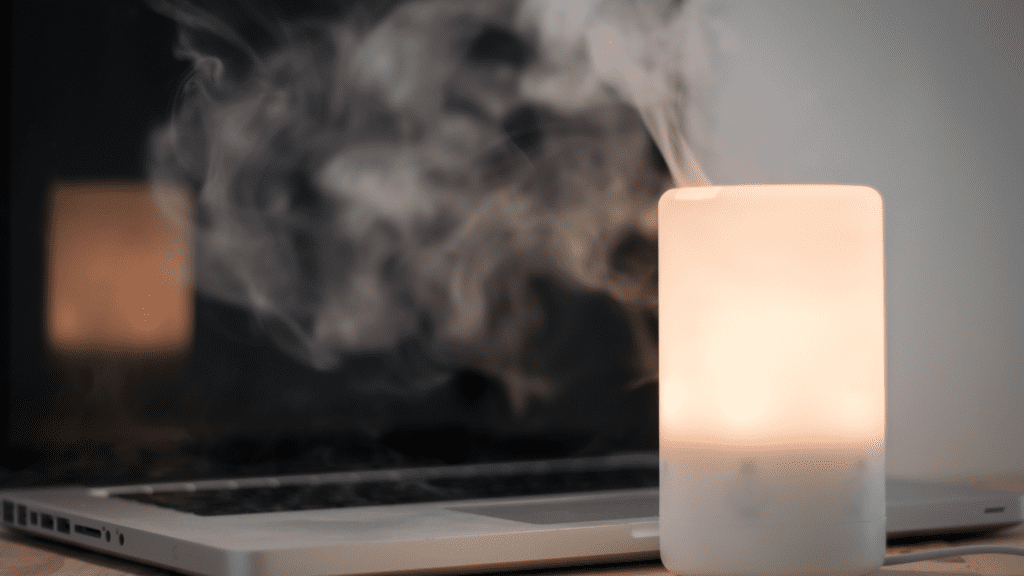
The problem of false alarms arises when both, ionization detectors and photoelectric smoke alarms fail to differentiate between the ionized air molecules and the smoke molecules. Thus, rather than turning on the fire alarm for flash fires, ionization smoke alarms or photoelectric smoke detectors can turn On when they sense water molecules in the vicinity.
How to stop humidifier from setting off smoke detector?
Having a smoke alarm installed for your entire house is crucial. Countless lives have been saved from dangerous fire accidents. However, having more false alarms on a regular basis can be difficult to deal with. The more false alarms you have, you may fail to take notice of a real alarm from flash fires. There are a few measures you can take to avoid false alarms.
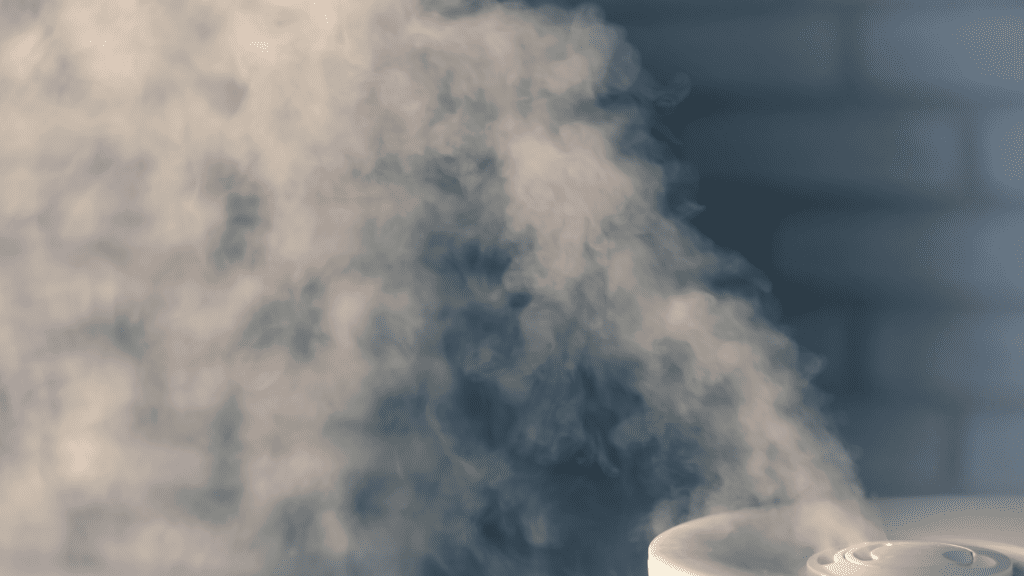
A humidifier is an equally important unit to maintain healthy humidity levels indoors. If your fire alarm keeps going off due to your humidifier, you must address this false alarm as well. Let us take a look at how you can avoid false alarms from a humidifier trigger.
Humidity level
Having a built-in humidistat to monitor the humidity levels can help you to avoid false alarms. Using a humidifier to raise low humidity levels can sometimes lead to an area that has a high humidity level when the mist from the unit is released into the room. You must watch out that the relative humidity level in the room does not exceed 85%. You can ensure that the desired humidity set on the device is also not on the higher end. Relative humidity set and maintained under 85% can prevent a false alarm.
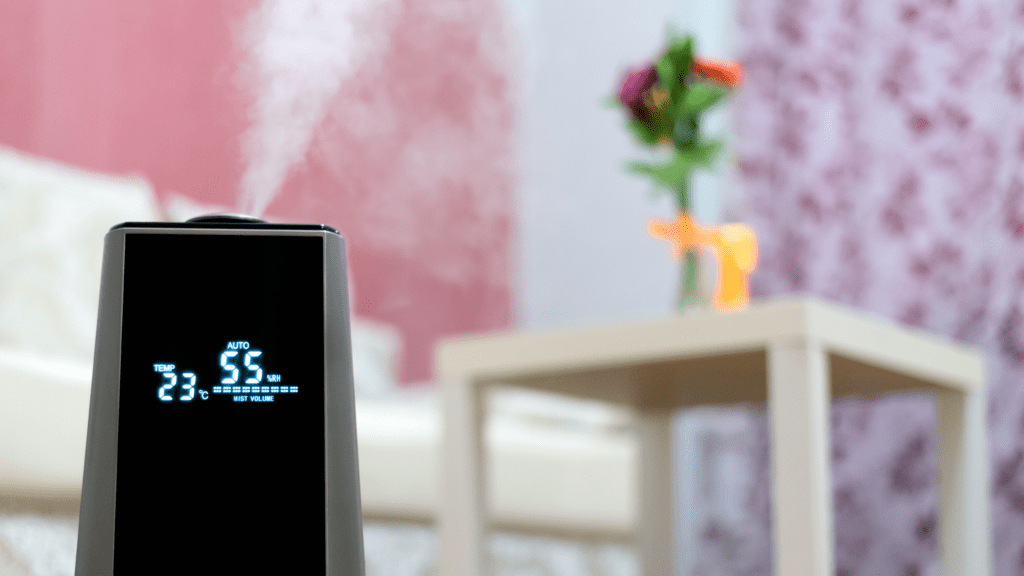
Humidifier placement
Fire marshals share another reason why humidifiers can trigger a false alarm assuming that they are detecting flash fires. Placing a humidifier near the bathroom is not ideal. Fire marshals suggest keeping the humidifier away from the bathroom.

Placing a warm mist or cool mist unit near the bathroom will not just increase the relative humidity levels of the place, but will also mistake the warm steam coming from the shower to be a fire. You can prevent your fire alarm from raising a false alarm by keeping humidifiers away from the bathroom area.
Smoke alarm sensitivity levels
Another easy way to prevent false alarms is by adjusting the sensitivity levels of the safety sensors. Most smoke detectors come with the facility to adjust their sensitivity level to humidity levels. Adjusting this level can prevent a false alarm from turning on.
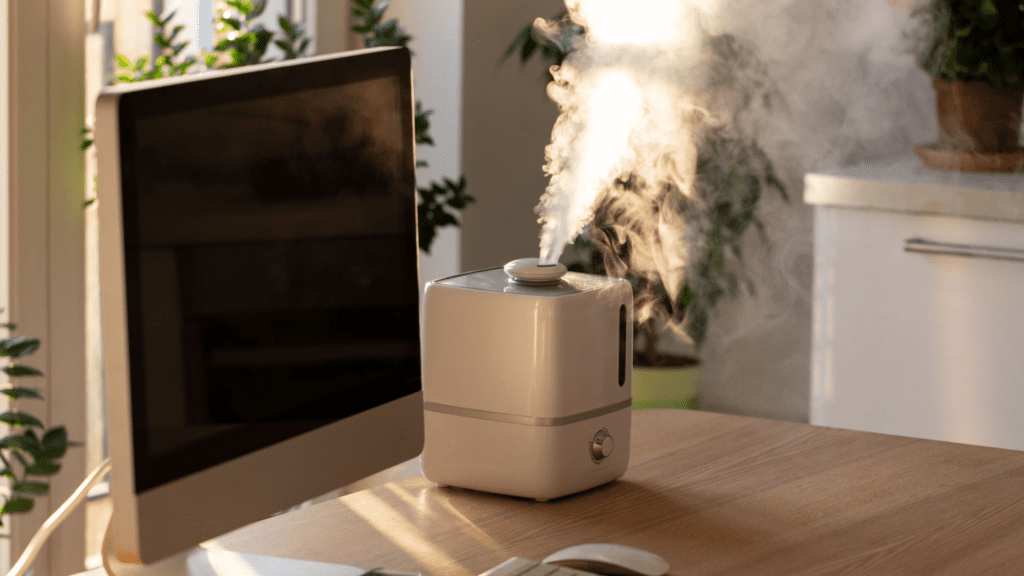
People residing in a moist climate will require a unit that is built to withstand higher humidity levels. It is recommended that you adjust the sensitivity to the humidity level and the temperature accordingly to prevent a false alarm.
Cleaning
Did you know that cleaning a smoke detector regularly is also important? The outer casing of the smoke alarm especially is a magnet for smoke molecules and water particles. As these water droplets remain on the outer casing they are allowing going to attract small insects and pests. Cleaning the inside and the outer casing of the smoke detector regularly can also prevent false alarms.

Best of both technologies
The sensitivity of a photoelectric smoke detector is different from ionization smoke detector. Some fire marshals suggest having ionization smoke detectors and photoelectric detectors. Even if one goes off due to a false alarm you will be able to recognize it from the other.
Increase ventilation
The excess moisture particles from the environment can be removed by using an exhaust fan. Increase ventilation by opening out the windows and doors whenever possible and turning on the exhaust fan when the humidity level is on the higher end. Expelling moisture particles from the area with an exhaust fan can help in avoiding false alarms from smoke detectors.
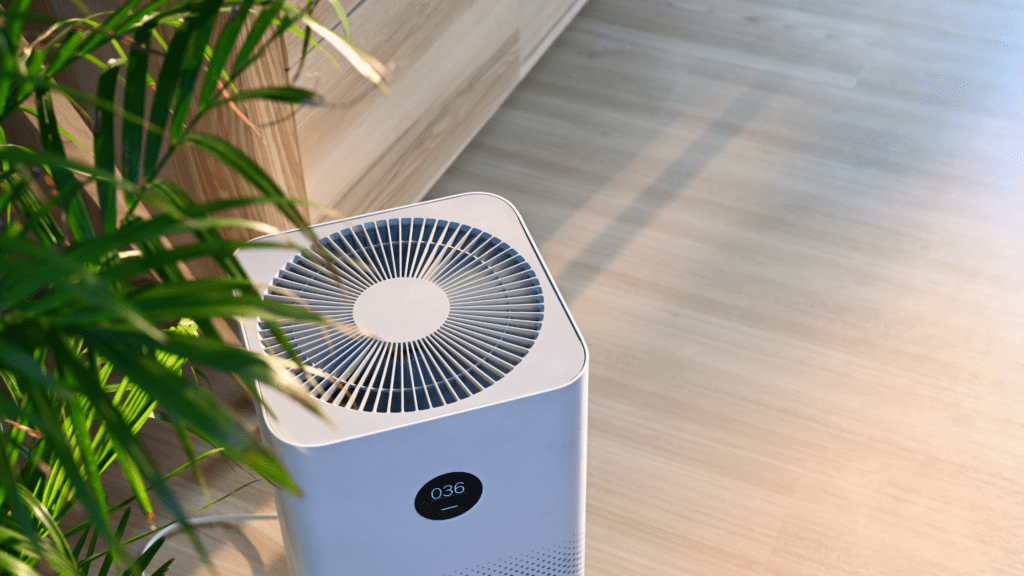
Why do smoke alarms go off for no reason?
If your smoke alarm is going off for no apparent reason, it is time that you change the batteries. If the false alarms continue despite changing the batteries, then it could indicate that it is time you looked into the internal parts or changes the whole set of smoke detectors. It is crucial to have smoke detectors in perfect working condition at all times.
Best smoke detector that can differentiate between smoke & steam:
There are plentiful smoke detectors available in the market for a house and other public places like shopping malls. Here we have for you the best smoke alarm available in the market that is equipped to differentiate between smoke particles and steam from humidifiers.
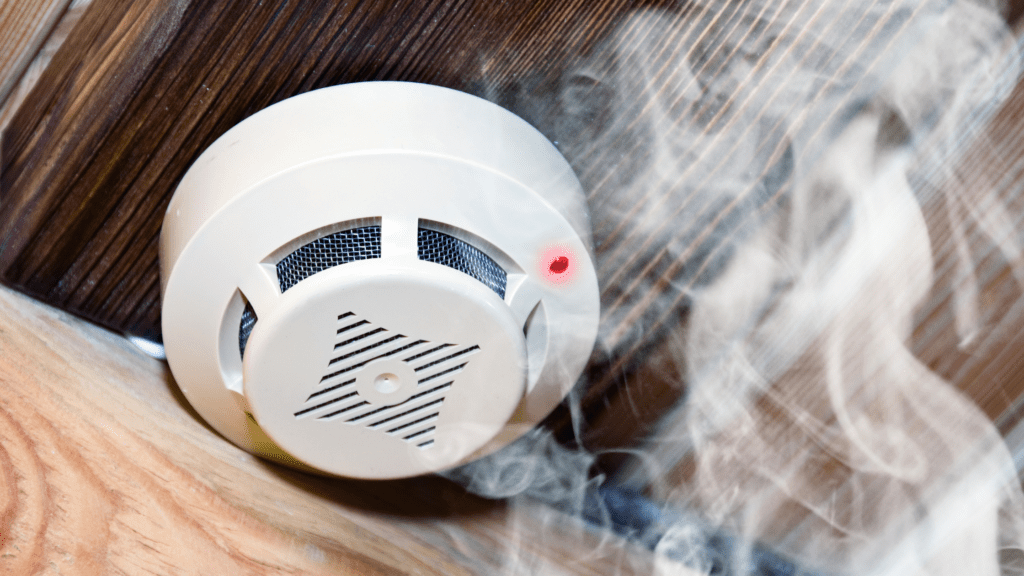
Google Nest Protect
It is one of the best smoke detectors on the market that comes with several advanced features. Google Nest Protect is equipped with a voice alert system to speak up when smoke or Carbon monoxide is detected. It also has a light-in-the-dark feature, to light up the pathway as someone walks below. The Split-Spectrum Sensor in the Google Nest Protect is capable of identifying both fast and slow-burning fires.
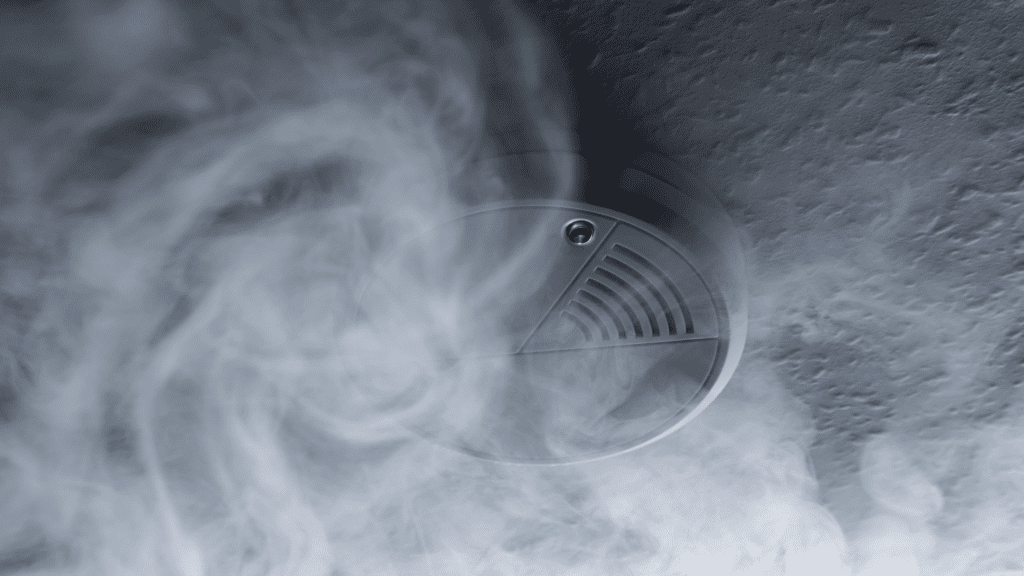
The best user-friendly and advanced feature of the Google Nest Protect smoke detector is its phone connectivity. Simply connect the fire alarm to your phone and receive updates and alerts on your phone anywhere with Wi-Fi access. You can receive updates and alerts on your phone for low batteries, friendly heads-up alerts, and even turn Off a false alarm from your phone.
Are you convinced this is the best smoke alarm you can find? Visit Amazon.com right away to purchase the Google Nest Protect fire alarm at the best price.
Pros and Cons of Google Nest Protect
- Equipped with advanced sensors to identify smoke and Carbon monoxide poisoning.
- In-built Split-Spectrum Sensor to identify fast and slow burning fires.
- Phone connectivity with Wi-Fi to send voice alerts to your phone; on probable fire accidents, to turn Off fire alarm, low battery alert, etc.
FAQ Section
1. Can a cool mist humidifier set off smoke alarm?
A cool mist humidifier can trigger a fire alarm to turn On if the humidifier is too close to the smoke alarm and it has raised the humidity level of the room. One must remember that apart from the aspect of a cool mist or warm mist steam, the smoke alarm can raise its alarm when the humidity levels are high as well.
2. Can a diffuser set off a smoke alarm?
A diffuser will produce a very small cloud of smoke. Although it is equipment that heats the water it will not trigger the smoke alarm unless it has been deliberately held too close to the smoke detector while it runs or heats the water.
3. Can a humidifier cause carbon monoxide?
Carbon monoxide is a by-product of oil and gas burning partially and it is very unlikely that a humidifier can lead to CO release. CO is a poisonous gas that is fatal and it is highly recommended by fire marshalls to have a CO detector or a fire alarm that has a CO detector in it.
4. Can a humidifier be a fire hazard?
A warm mist humidifier that uses hot water is a burn hazard. Any electrical device that is not carefully handled with the electrical lines and outlet can be a potential fire hazard.
Wrapping Up
That’s a wrap on the article. We trust the article was able to answer your doubts concerning how can a humidifier set off a smoke alarm. Share with us in the comments below your experiences with false alarms from using humidifiers. Let us know which is your most trusted smoke alarm available in the market and why.

About The Author
Charles Allen is an enthusiast of HVAC/indoor air. He has been fascinated by the way HVAC systems work since he was a child. He enjoys learning about new technologies and finding ways to improve the efficiency of HVAC systems. He is always looking for new ways to help people save money on their energy bills.